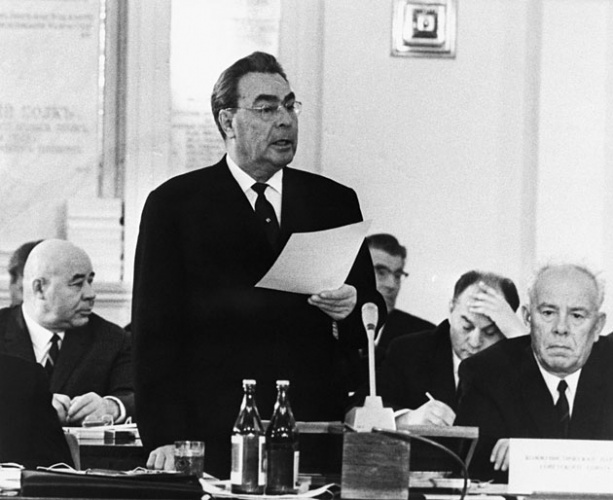Lost in his senile alcoholic fog, he did as his psychophantic advisors told him to do.
垂垂老矣,成日与酒精为伴,勃列日涅夫的心理建议师让他怎么做,他就怎么做。
One such bright idea was the invasion of Afghanistan on Christmas Day 1979.
其中一个很棒的想法就是在1979年圣诞节入侵阿富汗。
One would have assumed that someone in the Soviet hierarchy would have learned the necessary lessons from the American fiasco in Vietnam.
大家本来觉得苏联的领导会从美国在越南战争的惨败中学到必要的教训。
But what Brezhnev wanted apparently a successful little war was what the Soviet Union got.
但是勃列日涅夫想要的显然是个很小的成功,这也是苏联最后得到的。
Soon, the USSR was up to its neck in a bloody, expensive guerrilla war, which it could neither win, nor get out of.
很快,苏联也陷入残忍、开支巨大的游击战中,它既赢不了,也无法脱身。

The United States pulled itself out of its malaise with the same hard work and positive attitude we had shown in riding out the Great Depression.
美国通过和大萧条中同样辛苦的努力和认真的态度才得以从低迷中走出来。
But the Afghan War would be the powder keg which blew the rotten Soviet state sky high.
而阿富汗战争像炸药桶一样,将已经腐朽的苏联炸了个半死。
Segment 29c: After the Cold War.
29段第三部分:冷战后。
Striking directly at Iran was unlikely, given the logistics.
从后勤上来说,直接攻打伊朗不太可能。
It was also imprudent for America to do so, given the state of the hostage crisis.
考虑到人质危机问题,美国如果这样做会过于鲁莽。
Quite understandably, America was looking at ways to strike back at the Shiite Iranian regime.
因此,美国希望找到能够回击什叶派伊朗政权的方式。



